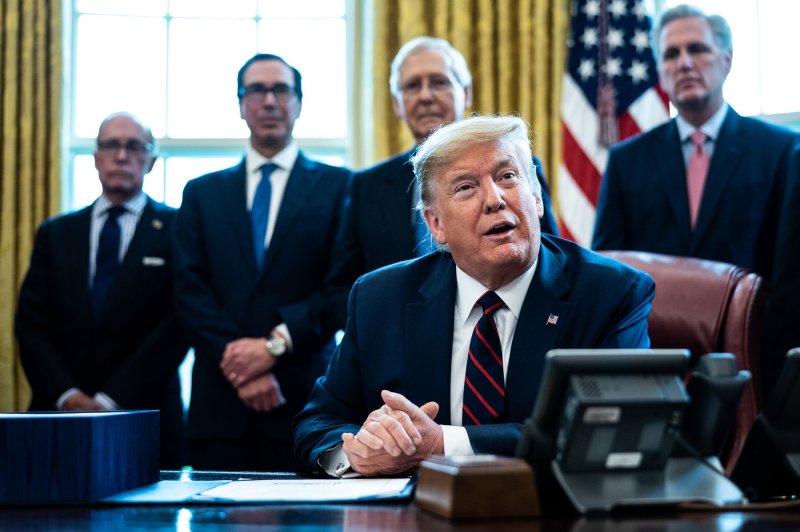1 of 6 | President Donald Trump participates in a signing ceremony for a $2 trillion coronavirus relief bill in the Oval Office on Friday. Photo by Erin Schaff/UPI |
License Photo
March 27 (UPI) -- President Donald Trump on Friday put his signature on a $2.3 trillion relief package to support Americans and the U.S. economy amid the coronavirus emergency.
The signing ceremony came hours after the House overwhelmingly passed the legislation. The Senate passed the bill Wednesday in a unanimous vote.
"I want to thank Democrats and Republicans for coming together and putting America first," Trump said during the ceremony in the Oval Office.
"This is a very important day. I've signed the single biggest economic relief package in American history," he added.
The measure passed the House on Friday afternoon despite a threat from Rep. Thomas Massie, R-Ky., to hold it up by requesting an in-person House vote amid widespread quarantine orders across the country.
The legislation -- the largest ever passed by the Senate -- provides direct payments of $1,200 to Americans who earn $75,000 or less and $2,400 to married couples who earn $150,000 or less. Those who earn above those thresholds will receive gradually smaller amounts, with individuals who make $99,000 or more and couples who make $198,000 or more receiving nothing. Those with children will receive $500 for each child.
It also creates a small business loan program, a fund for industries and a fund for states and localities whose coffers have been depleted.
The measure also expands unemployment insurance to four months and includes money for hospitals, nursing homes and other healthcare facilities.
"This will deliver urgently needed relief to our nation's families, workers and business," Trump said at the signing. "That's what this is all about."
Senate Democratic leader Chuck Schumer, praised the bill's passage in the House and called for the Trump administration to quickly implement the federal programs established by the legislation.
"We ensured that the federal government has the resources and tools [the American people] need ... and we will be watching President Trump minute by minute to make sure he and his administration do it right," he said.
The leadership of both parties had been planning to approve the package on a voice vote, since it has broad bipartisan support. That meant that not all voting members needed to be physically present to vote at the U.S. Capitol and a quorum need not be in the chamber.
"The Senate did some voodoo just like with Obamacare. Took a House bill dealing with taxes, stripped every word, and put their bill in it," Massie tweeted Thursday. "It's the House's job to reject the process.
"Not a good deal."
Trump criticized Massie for potentially holding up passage of the measure, calling him "a third rate Grandstander."
"Workers and small businesses need money now in order to survive," he tweeted. "Throw Massie out of Republican Party!"
House Majority Leader Steny Hoyer's office urged Democrats late Thursday to return to Washington for the possibility of a roll call vote.
Once debate began Friday, the House spent hours debating the bill, during which lawmakers of both parties said it's important to funnel relief quickly to Americans in crisis.
"America is fighting a war on two fronts -- a public health crisis, and an economic crisis," said Rep. Bryan Steil, R-Wis., "and while far from perfect, the [bill] provides much-needed relief -- testing, supplies for hospitals, protections for workers' paychecks, and assistance for those who lost their jobs."
"As many have said this bill is far from perfect, but let's be clear about one thing: the American people need relief now," added Rep. Joe Neguse of Colorado. "Not tomorrow, not next week or next month, but now."
There were about 50 House members present in the chamber as debate began, far short of a quorum.
Playground equipment is closed off to children to help stop the spread of COVID-19 at a park in Takoma Park, Md., on April 15. Photo by Kevin Dietsch/UPI |
License Photo
















